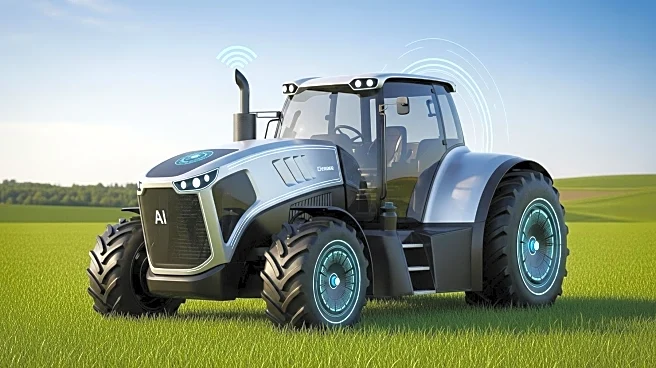What is the story about?
What's Happening?
CNH Industrial is leveraging artificial intelligence to transform the agricultural sector, focusing on enhancing productivity and sustainability. The company, known for its long-standing support to farmers, is integrating AI systems into its machinery, such as combines, tractors, and sprayers. These systems make real-time complex decisions, optimizing inputs and steering vehicles to improve yields. Technologies like SenseApply™ sprayer automation utilize machine vision to apply treatments precisely, reducing herbicide use and boosting productivity. CNH's efforts are part of a broader initiative to address challenges like limited farming land, climate change, and labor shortages. Insights from industry experts, including Francesca Protano, Head of Technology Strategies and Product Innovation at CNH, and Dr. Dennis Buckmaster from Purdue University, highlight the role of AI and connectivity in shaping the future of farming.
Why It's Important?
The integration of AI in agriculture by CNH Industrial is significant as it addresses critical challenges faced by the industry, such as climate change and labor shortages. By optimizing resource use and improving productivity, AI technologies can lead to more sustainable farming practices. This transformation is crucial for the agricultural sector, which is under pressure to produce more with less due to environmental constraints and increasing global food demand. The advancements in AI-driven machinery not only benefit farmers by increasing efficiency but also contribute to environmental conservation by reducing chemical usage. As CNH Industrial continues to innovate, it sets a precedent for other companies in the sector to adopt similar technologies, potentially leading to widespread improvements in agricultural practices.
What's Next?
CNH Industrial is expected to continue its focus on AI-driven innovations, further enhancing its machinery and equipment to meet the evolving needs of the agricultural sector. The company may expand its AI applications to other areas of farming, potentially exploring new technologies that can further reduce environmental impact and increase efficiency. As these technologies become more prevalent, farmers and industry stakeholders will likely need to adapt to new methods and practices, potentially requiring training and support to fully leverage AI capabilities. Additionally, CNH's ongoing commitment to sustainability and productivity may influence policy discussions around agricultural technology and environmental conservation.
Beyond the Headlines
The integration of AI in agriculture by CNH Industrial could have broader implications beyond immediate productivity gains. Ethically, the use of AI raises questions about data privacy and the potential displacement of traditional farming roles. Legally, the adoption of AI technologies may require new regulations to ensure safe and fair use. Culturally, the shift towards high-tech farming could alter the perception of agriculture, traditionally seen as a labor-intensive industry. Long-term, these advancements might lead to a more tech-driven agricultural landscape, influencing educational programs and workforce development in rural areas.















